Five years after his acclaimed star turn as Willy Loman, Rob Morrow returns to the Ruskin Group Theatre in another powerhouse role, that of Holocaust survivor-turned-New York publisher Isaac Geldhart in Jon Robin Baitz’s The Substance Of Fire, a family drama unfortunately not in the same league as Death Of A Salesman.
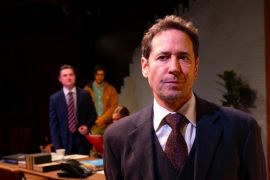 The year is 1987, over four decades since Isaac’s arrival in The Big Apple, forty-plus years during which his family-owned publishing house has made a name for itself putting out such mammoth works as “An Atlas of the Holocaust” and “Water on Fire, an Oral History of the Children of Hiroshima.”
The year is 1987, over four decades since Isaac’s arrival in The Big Apple, forty-plus years during which his family-owned publishing house has made a name for itself putting out such mammoth works as “An Atlas of the Holocaust” and “Water on Fire, an Oral History of the Children of Hiroshima.”
With titles as commercially unappealing as these, not to mention the six-volume opus on Nazi medical experiments Isaac now plans to publish, it’s perhaps no wonder the house currently finds itself on the verge of bankruptcy, though not perhaps if he accepts younger son Aaron’s (Emmitt Butler) proposal that they publish a surefire bestseller, namely Val Chenard sex-packed novel “Rising Tides,” and accept a financial bailout by a group of wealthy Japanese backers.
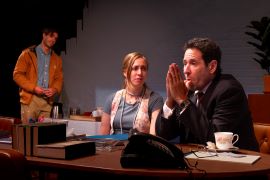 Anticipating his father’s staunch opposition, Aaron has enlisted the aid of siblings Martin (Barret T. Lewis) and Sarah (Fiona Dorn) in hopes of either convincing Isaac to forego publication of a six-volume recipe for disaster or forcing him out of power with their combined 60% of company shares.
Anticipating his father’s staunch opposition, Aaron has enlisted the aid of siblings Martin (Barret T. Lewis) and Sarah (Fiona Dorn) in hopes of either convincing Isaac to forego publication of a six-volume recipe for disaster or forcing him out of power with their combined 60% of company shares.
All of this family drama adds up to a first act reminiscent of HBO’s Succession, with Aaron, Martin, and Sarah standing in for Kendall, Ronan, and Shiv Roy and Isaac giving Logan some stiff competition in the imperious patriarch department.
Audiences can be excused, therefore, for assuming/hoping that The Substance Of Fire’s second act will provide more of the same shifting loyalties and back-stabbing power bids.
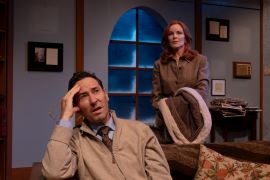 Not so, because playwright Baitz pretty much jettisons that in favor of an Act Two that fast-forwards three and a half years to a meeting between Isaac, now exiled to his Gramercy Park apartment, and psychiatric social worker Marge Hackett (Marcia Cross), sent by court order to evaluate the competence of a man who may no longer be in full control of his mental facilities, though Marge may have her own ulterior motive for her visit.
Not so, because playwright Baitz pretty much jettisons that in favor of an Act Two that fast-forwards three and a half years to a meeting between Isaac, now exiled to his Gramercy Park apartment, and psychiatric social worker Marge Hackett (Marcia Cross), sent by court order to evaluate the competence of a man who may no longer be in full control of his mental facilities, though Marge may have her own ulterior motive for her visit.
An LA Times review of The Substance Of Fire’s Los Angeles premiere back in 1993 called Baitz’s 1990 play “two one-acts in search of a full-length play,” a perfect description of a play that never really gels into one satisfying whole.
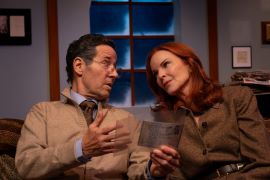 That’s not to say that each act isn’t compelling on its own, Morrow committing totally to an almost entirely unsympathetic character and Cross quite good as a woman who brings her own agenda (and feelings) to her court-mandated visit.
That’s not to say that each act isn’t compelling on its own, Morrow committing totally to an almost entirely unsympathetic character and Cross quite good as a woman who brings her own agenda (and feelings) to her court-mandated visit.
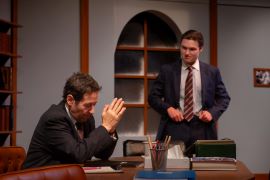 The Substance Of Fire also proves a terrific talent showcase for its three younger stars, Lewis investing Martin with a rumpled, tousle-haired charm, Dorn revealing the pain of a daughter too often given short shrift, and Butler taking command of the stage from his first entrance as a man on a mission, even if that mission appears doomed from the start.
The Substance Of Fire also proves a terrific talent showcase for its three younger stars, Lewis investing Martin with a rumpled, tousle-haired charm, Dorn revealing the pain of a daughter too often given short shrift, and Butler taking command of the stage from his first entrance as a man on a mission, even if that mission appears doomed from the start.
Mike Reilly’s direction is mostly topnotch, though he loses points where attention to accents is concerned. (Butler’s New York vowels befit a character who was born and grew up there while Dorn’s and Lewis’s neutral American accents could be from anywhere in the U.S., and though Baitz’s script specifically states that Isaac should have only “the slightest of … barely discernible” Belgian-German accents, Morrow’s is thick enough as to occasionally impede comprehension.)
Ryan Wilson’s well-appointed office set morphs ingeniously during intermission into Isaac’s lived-in Gramercy digs, with Edward Salas providing Grade-A sound and lighting designs and Michael Mullen designing costumes that fit both Baitz’s characters and the play’s time frame.
The Substance Of Fire is produced by John Ruskin. Nicole Millar is production stage manager and Allen D.W. is assistant stage manager. Ruby Garver is creative prop manager and stage hand. Casting is by Paul Ruddy.
 Having raved about Rob Morrow’s performance as the doomed Willy Loman and as a big fan of Jon Robin Baitz’s Other Desert Cities and The Paris Letter, I had the highest of hopes for The Substance Of Fire.
Having raved about Rob Morrow’s performance as the doomed Willy Loman and as a big fan of Jon Robin Baitz’s Other Desert Cities and The Paris Letter, I had the highest of hopes for The Substance Of Fire.
Though hardly a major disappointment, the Ruskin Group Theatre’s latest nonetheless falls short of the company’s most recent triumphs.
Ruskin Group Theatre, 3000 Airport Avenue, Santa Monica.
www.ruskingrouptheatre.com
–Steven Stanley
July 12, 2024
Photos: Alex Neher
Tags: Jon Robin Baitz, Los Angeles Theater Review, Ruskin Group Theatre


 Since 2007, Steven Stanley's StageSceneLA.com has spotlighted the best in Southern California theater via reviews, interviews, and its annual StageSceneLA Scenies.
Since 2007, Steven Stanley's StageSceneLA.com has spotlighted the best in Southern California theater via reviews, interviews, and its annual StageSceneLA Scenies.







 COPYRIGHT 2025 STEVEN STANLEY :: DESIGN BY
COPYRIGHT 2025 STEVEN STANLEY :: DESIGN BY